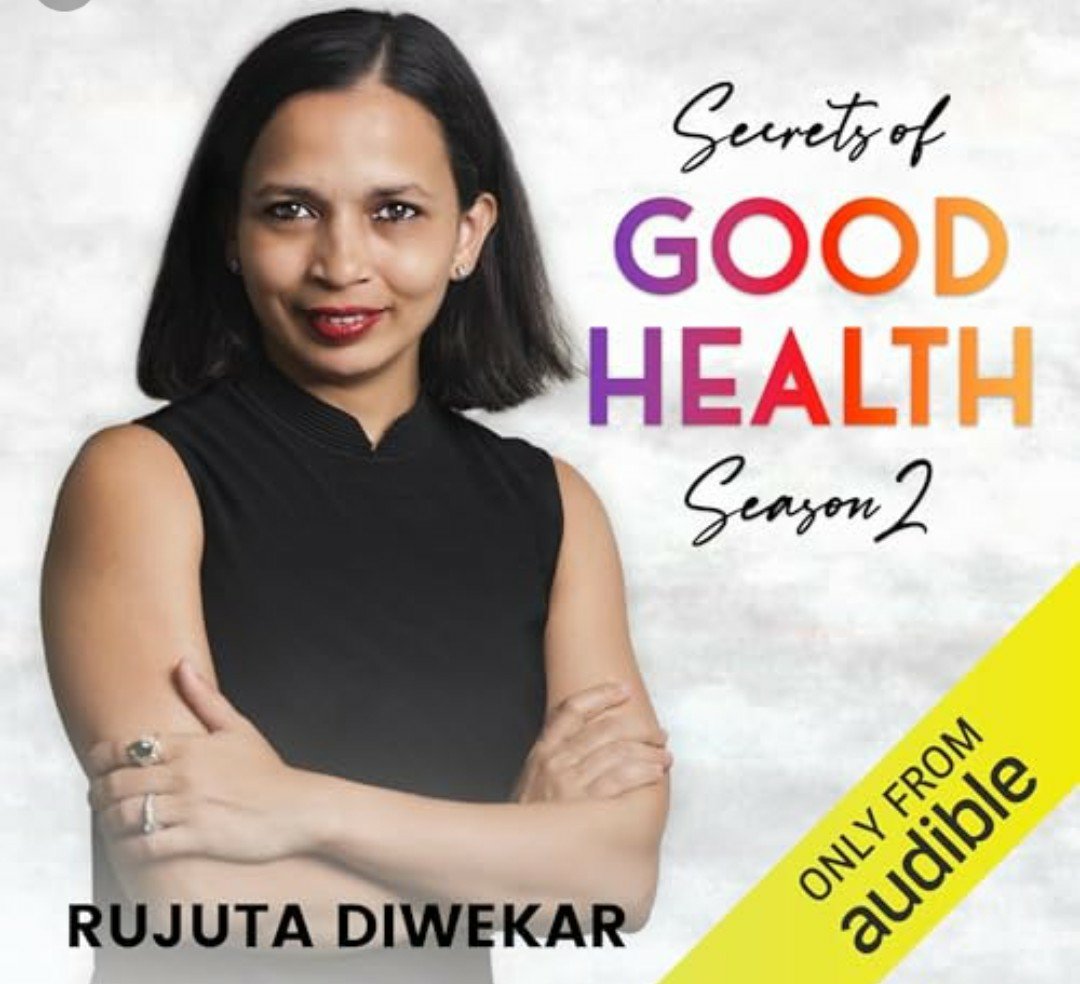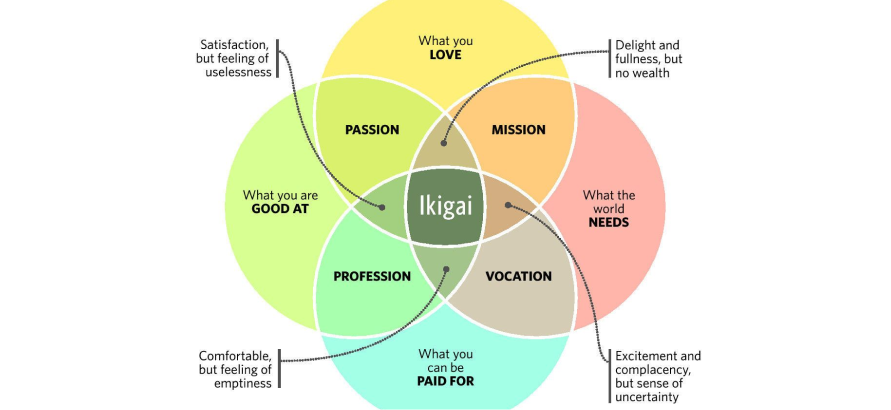
This note, titled as “Secrets of Good Health” is a summary from an audio podcast on Audible, from Rujuta Diwekar, one of the most qualified and sought after nutrition and wellness expert. I had the fortune of training for my first marathon under Rujuta, in 2010. In this podcast, Rujuta presents a simple, yet little understood definition of good health. She emphasizes the importance of following a diet and exercise routine which is sustainable over a life time, and staying away from fitness fads or quick fixes. Right through the podcast she provides insights and simple yet effective actionable points that once can follow in the daily routine.
What is Good Health ?
– Good health is about improving the functionality and the quality of our day to day life. It should help us live a happier and a fulfilling life.
– Being fit means feeling light on your feet, healthy and happy in your heart and your head. Fitness is the benefit that you get out of building good habits.
– Good health comes in all weights, sizes and shapes. Don’t confuse between your weight and your health. Each one of us is healthy at a different body weight. Don’t be obsessed about reducing weight.
– Measures of good health are good digestion, sound sleep, good skin and hair, waist to hip ratio
– There is no shortcut to losing weight or getting slim. It requires small, slow, steady and sustainable efforts every day.
The 3 Guidelines on Healthy Diet and Well being:
1. Eat according to your cultural traditions
2. Eat according to your personal preference
3. Eat according to your budgetary constraints
5 Habits for Good Health
Sustainable weight loss means that your reduce 5 to 10% of your current weight within a year. Our focus needs be on building long lasting habits that we can sustain over a long period of 30 to 35 years, and right through life.
1. Don’t stand on the weighing scale every day. Weigh yourself once every 3 months. It’s important to feel light from within even if the weight doesn’t reduce significantly.
2. Don’t follow diets with names, or with the terms such as protein, carbohydrates and fat.
3. Don’t compare your fitness journey with that of others, or your own progress in the past.
4. Don’t kill yourself in the gym. An exercise should make you feel good, improve your energy levels, give you better sleep. Exercise like a real human being. 150 minutes of exercise in week is adequate for good health. You have to make a habit of exercising right through your life.
5. Don’t sleep at night on the next calendar day. Sleep on the same day as you wake up. Try to sleep before 11:30 pm latest.
Don’t fall for food fads of the weight loss industry or fall for their profit making scheme. Common sense is better than every formula or fad. Everything when consumed in an appropriate proportion, and with mindfulness will do good.
A Simple formula to maintain good health is:
1. Eat home cooked food, avoid outside food.
2. Sleep in time, get adequate sleep.
3. Exercise regularly.
Good Food Habits at Home, Work & during Travel
– At Home – Don’t skip or delay your breakfast. Eat a healthy and wholesome breakfast within the first few hours of waking up. There are plenty of breakfast foods in traditional Indian culture. Not eating a good breakfast will result in hunger pangs at the end of the day, where in you end up overeating to match up the calories your body needs.
– At Work – Plan your food intake between 4 to 6 pm. This helps you get the required mental and physical energy to take you through the evening, and will avoid acidity and bloating. There are plenty of evening snack options in Indian culture. You can have nuts, banana, dry snacks or light snack food. If you do not consume anything between 4 and 6 pm, the cortisol level which causes stress increases.
– During Travel – Carry food during your travel. A fruit and or nuts; a sweet like dates, laddoos; a salty snack; a bottle of water. This will help reduce your travel stress as well.
Top Foods for 3 Common Health Issues are Sugar Craving, Acidity and Tiredness.
Maintaining diversity and equality in the food intake is essential for a right balance. The following are the three common health related issues, and the solution to them :
Sugar Craving can be addressed by:
– Intelligent use of spices in cooking. Learn to cook.
– Good use of vegetables, tubers (root vegetables) such as sweet potato, yam, (also arbi, suran)
– Use of peanuts and peanut powder in daily diet.
To prevent Acidity
– Start your day with soaked black resins, which are also naturally sweet.
– Consume curd and poha or rice as a mid meal.
– A glass of water with a spoon of gulkand mixed, to be consumed in small portions right through the day.
To avoid Tiredness
– Aliv seeds, Halim seeds, iron and folic acid containing seeds
– Sprouts and Pulses all types
– Cashews – 4 to 6 cashews, consumed mindfully
Exercise FAQs
– Don’t confuse your activity with your exercise. Exercise is non-negotiable. It helps improve the heart, brain, bones and maintaining the right balance of hormones.
– For reducing belly fat and for a flat stomach increase, build the strength of your lower body, strong legs and your hip muscle. Exercises like squats, lunges, dead lifts.
– Walking 4000 steps in a day are adequate, about 3 to 4 km. This helps in blood circulation.
– Women need to work on building strength in the upper body and back, along with lower body exercises.
– Building strength results in musculature and helps reduce fat.
– All ages are good to begin exercising. Start slow and get steady. Exercise helps reverse aging.
– Exercise right through your life – 30 minutes a day, or one hour every alternate day.
Kid’s Health
– Kids should follow the same diet as adults do. There is not need for very special foods.
– Kids should be kept away from junk food. If there is an ad, it’s bad.
– Height is genetic.
Preventing Stress Eating by Reducing Stress
– Food is interlinked with our emotional well being, moods.
– We don’t need apps to tell us that we have over eaten. Self regulation is important while eating.
– Regular exercise helps reduce stress. Continuous exercise for 30 minutes gives you a dopamine kick, and thus helps reduce stress eating. Exercise at least 4 to 5 times a week.
– A short nap of 30 minutes, before 3 pm every afternoon helps reduce the stress, makes you feel energetic in the evening, and helps sleeping well at night.
– The Cortisol – the stress hormone, naturally comes down around 6 pm every evening. However, if you do not consume anything between 4 and 6 pm, the cortisol level increases.
– Consume coconut, peanut and cashews in your regular diet. Coconut is used in our culture, as it gives physical energy and at the same time calms the mind. Peanuts and cashews give you vitamin B, iron, essential fatty acids and magnesium, and helps reduce stress.
Sleep Matters
– The greatest secret of good health is a sound nighttime sleep.
– It’s important to sleep at the right time, latest by 11:30 pm each day.
– Lack of sleep results poor digestion – bloating, acidity, constipation.
– Post dinner, walk gentle and relaxed 100 steps for a good sleep.
– Hormones such as growth hormone, thyroid and insulin get regulated in sleep. Our growth hormone which makes us feel and look healthy peaks in the night when we sleep.
– Good sleep is important for a good mental health.
– Sleep is important for learning, and mental work.
Don’ts Before Night Sleep
– No tea, coffee, chocolate or any form of caffeine after 6 pm in the evening, as it affects the quality of sleep.
– Don’t listen to any loud noises 2 to 3 hours before sleeping.
– Stay away from screen at least 1 hour before sleep.
– Do not consume any intoxicating substances in late evening, night.
Three Secrets for Good Sleep
– Have a proper dinner, between 7 and 9 pm. There should be a 3 hour gap between bedtime and dinner. Don’t fully avoid carbs at night.
– Have a cup of haldi milk, gulkand milk, or milk with powdered cashews, nutmeg before sleeping.
– A little ghee massage on the soles of the foot before sleeping.
Yoga
– Yoga is not fully understood. Yoga is all encompassing.
– Yoga by definition means a calm mind. Focussing with an aim to achieve excellence.
– Strength, Stamina, Stability and Stretching – the 4 main arms of exercise can be achieved by practicing yoga.
– Practise yoga 3 to 4 times a week, for at least 30 minutes to an hour.
Do’s and Don’ts for Good Digestion
– Finish your lunch with a spoon of ghee and jaggery.
– Have a banana every day.
– Curd and resins should be consumed.
– Be active. Walk, stay mobile.
– Have a quick short afternoon nap.
– Stay hydrated.
– Avoid over dose of tea, coffee. Don’t have tea or coffee after 4 pm.
– Balance your meals with time tested proportion of food.
– Avoid laxatives.
Your Health Assessment
– Assessing health based on body weight only, isn’t the correct approach.
– Waist to Hip Ratio signifies good health (0.7 to 0.8 in females, 0.9 – 1.0 in males).
– Male waist less than 40 inches, female waist less than 36 inches.
– Digestion assessment.
– Sugar Craving assessment.
– Exercise compliance – exercise 3 to 5 times a week.
– Sound night time sleep.
– Minimal pain during monthly periods for women.
Thank you Rujuta for sharing your secrets of good health.

